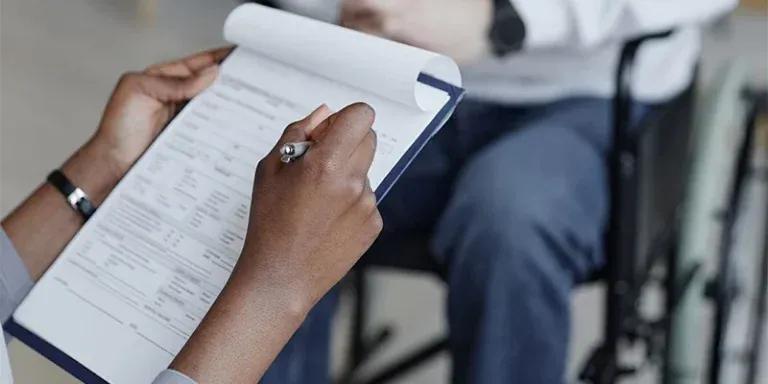
In the post-pandemic era, the shortage of healthcare staff has been brought to the forefront. That’s why, travel nursing has emerged as an upcoming employment choice for many nurses. And considering the unique perks and how financially fulfilling this role is, many nurses who are passionate about travel actively pursue this as a career path.
So, if you’re one of those adventurous spirits who’ve chosen travel nursing, and you’ve just landed an interview, then here’s what you need to ace it! As travel nursing interviews are a bit different from traditional nursing interviews, you need to strategically prepare your answers to highlight your skills and experiences. This will help hiring managers see you as a unique candidate. That’s why we’ve made a list of the top 5 questions, with sample answers, that you need to be prepared for in a travel nursing interview.
1. Tell me about yourself.
A generic question like this is aimed at understanding your motivation behind choosing your present career path. Some things you can highlight while framing this answer are your skills and your previous experiences that can make you a stronger fit for this role. You can also highlight any quantifiable patient care results you directly contributed to in your past assignments. Here’s a sample answer:
“I had been a Cardiac ICU RN for 6 years at Whitefield General in Miami. But, 3 years ago, I decided to turn to travel nursing to broaden my skillset and knowledge in diverse critical care settings. My recent travel assignments have primarily been focused on Level 1 trauma centers as rapid patient assessments are one of my strongest suits. I have a strong focus on evidence-based practice and patient advocacy. I also excel at interdisciplinary collaboration, which helped me foster strong relationships with physicians and respiratory therapists during one of my previous travel assignments. This actually led to a 10% decrease in ventilator-associated pneumonia rates in the ICU. I can also grasp and adapt to new protocols quickly, which has been proven through my numerous assignments in the past.”
2. How do you adapt to a new working environment?
This question can help the interviewer understand your adaptability and problem-solving abilities. So, make sure you highlight these qualities while answering. Here’s a sample answer:
“Initially, when I started out, I found this aspect of travel nursing to be quite challenging. There’re always new people, protocols and sometimes even equipment to get used to. But now I have become a lot better at adapting and integrating. The most successful approach that I’ve found is to ask lots of questions and be proactive. I start out by going through the employee handbook and familiarizing myself with organizational policies and the unit layouts of the facility. And I also reach out to my colleagues, especially the more experienced ones, to get to know the ins and outs, the basic routines and gain insights into the workflow.“
I believe that open communication is definitely important in this regard. Actively listening to feedback and suggestions from my colleagues actually helps me adapt and integrate more effectively. I consider myself a fast learner who’s always eager to expand my knowledge, so adapting to new environments is like a learning opportunity for me and play a big part in helping me improve my skills.”
3. How do you balance a busy work schedule with constant relocating?
A question like aims to examine essential soft skills like decision making, critical thinking and problem solving. So, frame your answer accordingly. Here’s a sample answer:
“It took me some time to adjust to the new routine but now I am much better at it. I find that thorough planning goes a long way. I create routines and schedules for both work and personal life to ensure I can meet my professional commitments while also prioritizing self-care and leisure activities. For instance, I utilize several meal prepping services or explore local healthy meal delivery options to save time on cooking during busy weeks. This way, I get to explore new places, but also find ways to feel at home, even for a short amount of time.”
4. What is your least favorite part of being a travel nurse?
While this question may focus on prominent negatives, you can downplay the negatives by focusing on how you adapt to these challenges to maintain a positive outlook. Here’s how you can consider answering this:
“The part that sucks for me the most are the goodbyes. It’s difficult to constantly part ways from people you’ve been spending so much time with. But staying in touch through texts, calls or social media makes it a little easier to maintain those relationships. I also find the constant change to be a bit disruptive and it takes me some time to get used to it. That’s why I try building sustainable routines to make it a lot easier to get back on track. I like exploring new places so that also helps with adjusting more easily. But on the bright side, the changes actually keep things fresh and have prompted me to learn new things and expand my skillset in different healthcare settings. I feel that these challenges have made me more resourceful and independent as a travel nurse.”
Also read:Tips to Help Travel Nurses Adjust to a New Hospital
5. What teams do you perform best in?
As travel nurses are hired to meet temporary staff shortages on seasonal increase in patient admissions, they can be floated to meet the requirements of different units during the same assignment. That’s why it is really important to highlight how adaptable and versatile you can be. Consider this answer:
“In my past assignments, I had the chance to work with various teams in different healthcare environments. I can adapt to a variety of team dynamics. But my skills are best utilized in environments where open communication and teamwork are prioritized. I feel that collaboration is one of the most important aspects of patient care, so I proactively developed skills like actively listening to my colleagues, sharing information effectively, so we can work together to achieve common goals. For instance, in a previous assignment, I collaborated effectively with the respiratory therapist team to implement a new ventilator weaning protocol, which resulted in improved patient outcomes.”
Over to you
While preparing for the interview, make sure you research the facility really well. This will help you incorporate their organizational values into your answers, which will show greater compatibility. If you’re feeling the pre interview jitters, you can also try doing mock interviews with a friend or colleague, and fine tune your answers based on their feedback. Landing your dream travel nursing assignment starts with acing the interview. And with dedication and preparation, you can do it easily!



